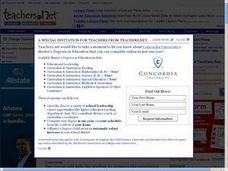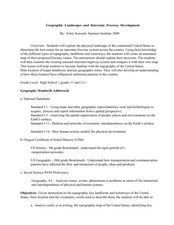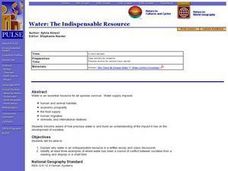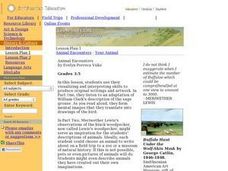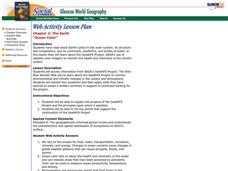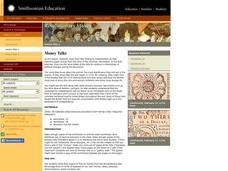Curated OER
SC Populations Along Major Interstates
Students examine the population among the interstates in South Carolina. Using the internet, they identify the counties and roads and compare it with their own drawing.
Curated OER
Geographic Landscapes and Interstate Freeway Development
Students investigate the topography of the United States through a discovery lesson. They create a hypothetical route for a highway across the United States. Students also conduct research major landforms and define geographic terms.
Curated OER
World Geography: Water: The Indispensable Resource
Young scholars are able to explain why water is an indispensable resource in a written essay and class discussion. They identify at least three examples of where water has been a source of conflict between societies from a reading and...
Curated OER
Ideas and Commodities Cross Cultural Regions
Students compare and contrast how commodities native to certain countries have impacted the economies of other nations. After gathering information regarding how commodities are grown and traded, students use their information to...
Curated OER
Cell Community
Seventh graders use technology to review cell structure and function. In this cells less, 7th graders review the parts and functions of a cell, and use photography/video and PowerPoint to enhance their explorations.
Curated OER
How Did That Get There?
Students evaluate the role of government in addressing land use and other environmental issues. They analyze the powers, responsibilities, and limitations of elected and appointed officials in the national legislative, executive, and...
Curated OER
Regions: Meet the Experts Presentation
Learners gather information and create a web site on prairies and plains using a variety of resources, including the internet.
Curated OER
"The Nation's Playground": Technology and Tourism
Students examine Maine tourism websites. They identify ways the Internet has changed the tourism industry in Maine.
Curated OER
River and Woodland Communities
Students examine the differences in the lifestyles of people living along a river and in the woods. They develop and discuss a class chart of the differences and similarities between the two communities.
Curated OER
Air Masses
Middle schoolers examine the physical characteristics of several types of air masses to discover how air masses can be identified and defined by their temperature and moisture content.
Curated OER
What Do You Need?
Students discover the difference between needs and wants. Using pictures, they develop a list of the needs and wants shown in each. They answer and discuss the answers to the questions as a class to end the lesson.
Curated OER
Lewis and Clark: The Language of Discovery
Middle schoolers replicate some of the trailblazing methods of Lewis and Clark on a fifteen-minute "writing journey" through the school or neighborhood.
Curated OER
Animal Encounters
Students use their visualizing and interpreting skills to produce original writings and artwork.
Curated OER
How Things Fly
Students observe photographs of selected twentieth-century aircraft at the National Air and Space Museum and note differences in the design of aircraft wings, fuselages, and engines.
Curated OER
Ocean Color
Pupils examine NASA's SeaWiFS Project Web site to explore how the SeaWiFS Project monitors environmental and climatic changes in the oceans and atmosphere. They answer questions and write a summary in support of continued funding for...
Curated OER
How Things Fly
Students, by drawing on their own experiences, discuss and examine the basic physics of flight. They participate in a variety of activities regarding flight.
Curated OER
Stories of the Wrights' Flight
Students examine and compare primary and secondary source accounts of the Wright brothers' first flights on December 17, 1903.
Curated OER
Money Talks
Students move from fact finding to interpretation as they examine paper money from the time of the American Revolution. In the final exercise, they use the issue dates of the bills to construct a chronology of political changes during...
Curated OER
Pictures Telling Stories
Students see the importance of primary sources in the study of history, but also the limitations of relying only on primary sources of taking the money, as it were, at face value.
Curated OER
Sow the Seeds of Victory! Posters from the Food Administration During World War I
Young scholars engage in a class analysis of posters, responding to each of the worksheet questions. They identify the similarities and differences between the posters.
Curated OER
The Rocky Shore
Students compare a realistic landscape painting with a photograph of the same place.
Curated OER
Dinosaur I Finding And Dating
Students investigate how long dinosaurs lived on Earth and how that compare to how long man has been on Earth. They discover how scientists excavate fossils.
Curated OER
Salmon Run
Students examine the life cycle of the Pacific salmon and the impact of humans on salmon migration. They watch a Powerpoint presentation, trace migration routes on satellite imagery, and complete mock calculations of salmon energy...
Curated OER
Two Ways About It
Students take an imaginary hike in two opposite directions along a lake. They view and interpret satellite images and discuss the pros and cons of hydroelectric dams.


